26届韩素音中文翻译
- 格式:doc
- 大小:22.00 KB
- 文档页数:4
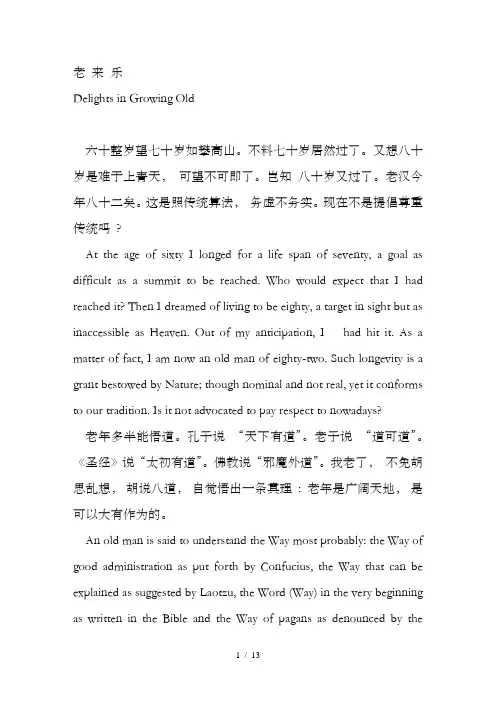
老来乐Delights in Growing Old六十整岁望七十岁如攀高山。
不料七十岁居然过了。
又想八十岁是难于上青天,可望不可即了。
岂知八十岁又过了。
老汉今年八十二矣。
这是照传统算法,务虚不务实。
现在不是提倡尊重传统吗?At the age of sixty I longed for a life span of seventy, a goal as difficult as a summit to be reached. Who would expect that I had reached it? Then I dreamed of living to be eighty, a target in sight but as inaccessible as Heaven. Out of my anticipation, I had hit it. As a matter of fact, I am now an old man of eighty-two. Such longevity is a grant bestowed by Nature; though nominal and not real, yet it conforms to our tradition. Is it not advocated to pay respect to nowadays?老年多半能悟道。
孔子说“天下有道”。
老子说“道可道”。
《圣经》说“太初有道”。
佛教说“邪魔外道”。
我老了,不免胡思乱想,胡说八道,自觉悟出一条真理: 老年是广阔天地,是可以大有作为的。
An old man is said to understand the Way most probably: the Way of good administration as put forth by Confucius, the Way that can be explained as suggested by Laotzu, the Word (Way) in the very beginning as written in the Bible and the Way of pagans as denounced by theBuddhists. As I am growing old, I can't help being given to flights of fancy and having my own Way of creating stories. However I have come to realize the truth: my old age serves as a vast world in which I can still have my talents employed fully and developed completely.七十岁开始可以诸事不做而拿退休金,不愁没有一碗饭吃,自由自在,自得其乐。
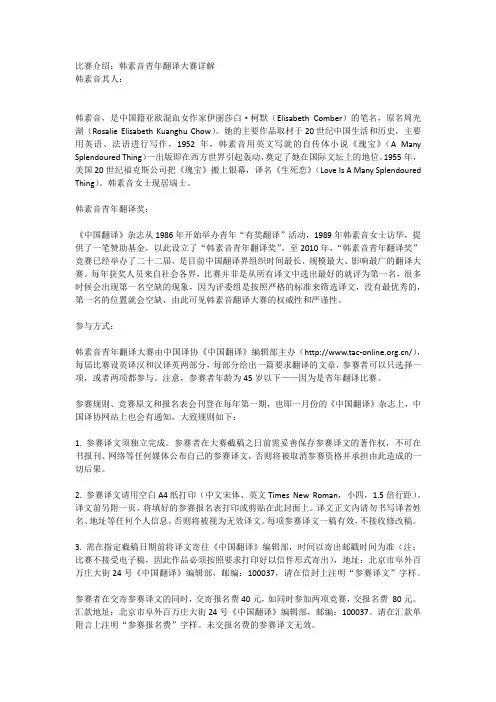
比赛介绍:韩素音青年翻译大赛详解韩素音其人:韩素音,是中国籍亚欧混血女作家伊丽莎白·柯默(Elisabeth Comber)的笔名,原名周光湖(Rosalie Elisabeth Kuanghu Chow)。
她的主要作品取材于20世纪中国生活和历史,主要用英语、法语进行写作,1952年,韩素音用英文写就的自传体小说《瑰宝》(A Many Splendoured Thing)一出版即在西方世界引起轰动,奠定了她在国际文坛上的地位。
1955年,美国20世纪福克斯公司把《瑰宝》搬上银幕,译名《生死恋》(Love Is A Many Splendoured Thing)。
韩素音女士现居瑞士。
韩素音青年翻译奖:《中国翻译》杂志从1986年开始举办青年“有奖翻译”活动,1989年韩素音女士访华,提供了一笔赞助基金,以此设立了“韩素音青年翻译奖”。
至2010年,“韩素音青年翻译奖”竞赛已经举办了二十二届,是目前中国翻译界组织时间最长、规模最大、影响最广的翻译大赛。
每年获奖人员来自社会各界,比赛并非是从所有译文中选出最好的就评为第一名,很多时候会出现第一名空缺的现象,因为评委组是按照严格的标准来筛选译文,没有最优秀的,第一名的位置就会空缺,由此可见韩素音翻译大赛的权威性和严谨性。
参与方式:韩素音青年翻译大赛由中国译协《中国翻译》编辑部主办(/),每届比赛设英译汉和汉译英两部分,每部分给出一篇要求翻译的文章,参赛者可以只选择一项,或者两项都参与。
注意,参赛者年龄为45岁以下——因为是青年翻译比赛。
参赛规则、竞赛原文和报名表会刊登在每年第一期,也即一月份的《中国翻译》杂志上,中国译协网站上也会有通知,大致规则如下:1. 参赛译文须独立完成。
参赛者在大赛截稿之日前需妥善保存参赛译文的著作权,不可在书报刊、网络等任何媒体公布自己的参赛译文,否则将被取消参赛资格并承担由此造成的一切后果。
2. 参赛译文请用空白A4纸打印(中文宋体、英文Times New Roman,小四,1.5倍行距)。
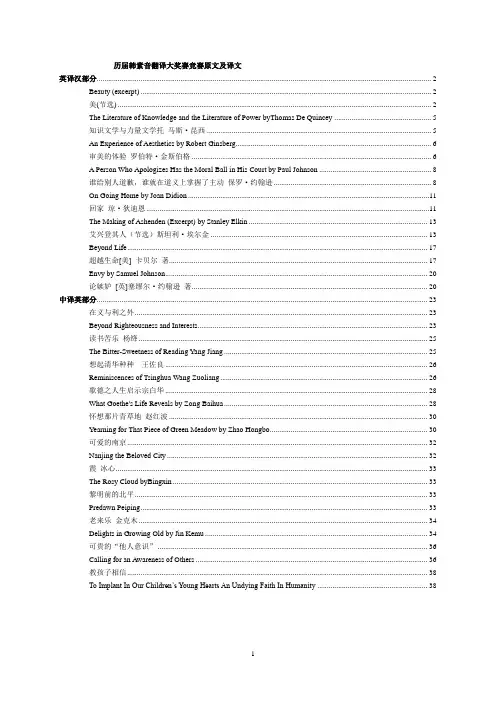
历届韩素音翻译大奖赛竞赛原文及译文英译汉部分 (2)Beauty (excerpt) (2)美(节选) (2)The Literature of Knowledge and the Literature of Power byThomas De Quincey (5)知识文学与力量文学托马斯.昆西 (5)An Experience of Aesthetics by Robert Ginsberg (6)审美的体验罗伯特.金斯伯格 (6)A Person Who Apologizes Has the Moral Ball in His Court by Paul Johnson (8)谁给别人道歉,谁就在道义上掌握了主动保罗.约翰逊 (8)On Going Home by Joan Didion (11)回家琼.狄迪恩 (11)The Making of Ashenden (Excerpt) by Stanley Elkin (13)艾兴登其人(节选)斯坦利.埃尔金 (13)Beyond Life (17)超越生命[美] 卡贝尔著 (17)Envy by Samuel Johnson (20)论嫉妒[英]塞缪尔.约翰逊著 (20)中译英部分 (23)在义与利之外 (23)Beyond Righteousness and Interests (23)读书苦乐杨绛 (25)The Bitter-Sweetness of Reading Yang Jiang (25)想起清华种种王佐良 (26)Reminiscences of Tsinghua Wang Zuoliang (26)歌德之人生启示宗白华 (28)What Goethe's Life Reveals by Zong Baihua (28)怀想那片青草地赵红波 (30)Yearning for That Piece of Green Meadow by Zhao Hongbo (30)可爱的南京 (32)Nanjing the Beloved City (32)霞冰心 (33)The Rosy Cloud byBingxin (33)黎明前的北平 (33)Predawn Peiping (33)老来乐金克木 (34)Delights in Growing Old by Jin Kemu (34)可贵的“他人意识” (36)Calling for an Awareness of Others (36)教孩子相信 (38)To Implant In Our Children’s Young Hearts An Undying Faith In Humanity (38)英译汉部分Beauty (excerpt)美(节选)Judging from the scientists I know, including Eva and Ruth, and those whom I've read about, you can't pursue the laws of nature very long without bumping撞倒; 冲撞into beauty. “I don't know if it's the same beauty you see in the sunset,”a friend tells me, “but it feels the same.”This friend is a physicist, who has spent a long career deciphering破译(密码), 辨认(潦草字迹) what must be happening in the interior of stars. He recalls for me this thrill on grasping for the first time Dirac's⑴equations describing quantum mechanics, or those o f Einstein describing relativity. “They're so beautiful,” he says, “you can see immediately they have to be true. Or at least on the way toward truth.” I ask him what makes a theory beautiful, and he replies, “Simplicity, symmetry .对称(性); 匀称, 整齐, elegance, and power.”我结识一些科学家(包括伊娃和露丝),也拜读过不少科学家的著作,从中我作出推断:人们在探求自然规律的旅途中,须臾便会与美不期而遇。
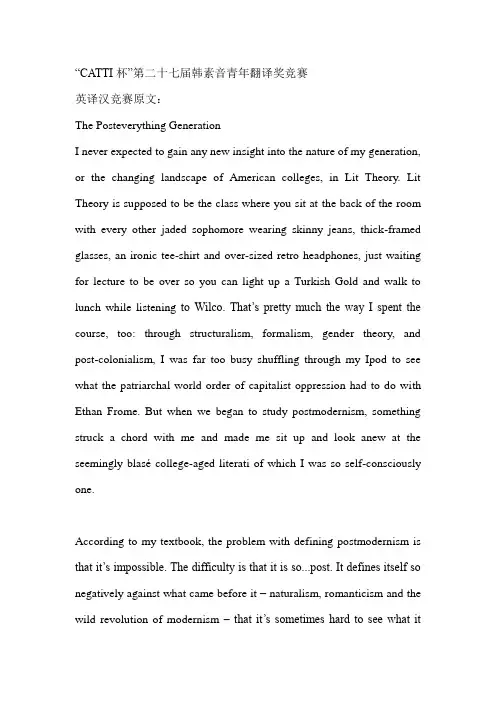
―CATTI杯‖第二十七届韩素音青年翻译奖竞赛英译汉竞赛原文:The Posteverything GenerationI never expected to gain any new insight into the nature of my generation, or the changing landscape of American colleges, in Lit Theory. Lit Theory is supposed to be the class where you sit at the back of the room with every other jaded sophomore wearing skinny jeans, thick-framed glasses, an ironic tee-shirt and over-sized retro headphones, just waiting for lecture to be over so you can light up a Turkish Gold and walk to lunch while listening to Wilco. That‘s pretty much the way I spent the course, too: through structuralism, formalism, gender theory, and post-colonialism, I was far too busy shuffling through my Ipod to see what the patriarchal world order of capitalist oppression had to do with Ethan Frome. But when we began to study postmodernism, something struck a chord with me and made me sit up and look anew at the seemingly blasé college-aged literati of which I was so self-consciously one.According to my textbook, the problem with defining postmodernism is that it‘s impossible. The difficulty is that it is so...post. It defines itself so negatively against what came before it – naturalism, romanticism and the wild revolution of modernism –that it‘s sometimes hard to see what itactually is. It denies that anything can be explained neatly or even at all. It is parodic, detached, strange, and sometimes menacing to traditionalists who do not understand it. Although it arose in the post-war west (the term was coined in 1949), the generation that has witnessed its ascendance has yet to come up with an explanation of what postmodern attitudes mean for the future of culture or society. The subject intrigued me because, in a class otherwise consumed by dead-letter theories, postmodernism remained an open book, tempting to the young and curious. But it also intrigued me because the question of what postmodernism –what a movement so post-everything, so reticent to define itself – is spoke to a larger question about the political and popular culture of today, of the other jaded sophomores sitting around me who had grown up in a postmodern world.In many ways, as a college-aged generation, we are also extremely post: post-Cold War, post-industrial, post-baby boom, post-9/11...at one point in his fa mous essay, ―Postmodernism, or the Cultural Logic of Late Capitalism,‖ literary critic Frederic Jameson even calls us ―post-literate.‖ We are a generation that is riding on the tail-end of a century of war and revolution that toppled civilizations, overturned repressive social orders, and left us with more privilege and opportunity than any other society in history. Ours could be an era to accomplish anything.And yet do we take to the streets and the airwaves and say ―here we are, and this is what we dema nd‖? Do we plant our flag of youthful rebellion on the mall in Washington and say ―we are not leaving until we see change! Our eyes have been opened by our education and our conception of what is possible has been expanded by our privilege and we demand a better world because it is our right‖? It would seem we do the opposite. We go to war without so much as questioning the rationale, we sign away our civil liberties, we say nothing when the Supreme Court uses Brown v. Board of Education to outlaw segregation, and we sit back to watch the carnage on the evening news.On campus, we sign petitions, join organizations, put our names on mailing lists, make small-money contributions, volunteer a spare hour to tutor, and sport an entire wardrobe‘s worth of Live S trong bracelets advertising our moderately priced opposition to everything from breast cancer to global warming. But what do we really stand for? Like a true postmodern generation we refuse to weave together an overarching narrative to our own political consciousness, to present a cast of inspirational or revolutionary characters on our public stage, or to define a specific philosophy. We are a story seemingly without direction or theme, structure or meaning –a generation defined negatively againstwhat ca me before us. When Al Gore once said ―It‘s the combination of narcissism and nihilism that really defines postmodernism,‖ he might as well have been echoing his entire generation‘s critique of our own. We are a generation for whom even revolution seems trite, and therefore as fair a target for blind imitation as anything else. We are the generation of the Che Geuvera tee-shirt.Jameson calls it ―Pastiche‖ –―the wearing of a linguistic mask, speech in a dead language.‖ In literature, this means an author s peaking in a style that is not his own – borrowing a voice and continuing to use it until the words lose all meaning and the chaos that is real life sets in. It is an imitation of an imitation, something that has been re-envisioned so many times the original model is no longer relevant or recognizable. It is mass-produced individualism, anticipated revolution. It is why postmodernism lacks cohesion, why it seems to lack purpose or direction. For us, the post-everything generation, pastiche is the use and reuse of the old clichés of social change and moral outrage – a perfunctory rebelliousness that has culminated in the age of rapidly multiplying non-profits and relief funds. We live our lives in masks and speak our minds in a dead language – the language of a society that expects us to agitate because that‘s what young people do. But how do we rebel against a generation that is expecting, anticipating, nostalgic for revolution?How do we rebel against parents that sometimes seem to want revolution more than we do? We don‘t. We rebel by not rebelling. We wear the defunct masks of protest and moral outrage, but the real energy in campus activism is on the internet, with websites like . It is in the rapidly developing ability to communicate ideas and frustration in chatrooms instead of on the streets, and channel them into nationwide projects striving earnestly for moderate and peaceful change: we are the generation of Students Taking Action Now Darfur; we are the Rock the V ote generation; the generation of letter-writing campaigns and public interest lobbies; the alternative energy generation.College as America once knew it –as an incubator of radical social change –is coming to an end. To our generation the word ―radicalism‖ evokes images of al Qa eda, not the Weathermen. ―Campus takeover‖ sounds more like Virginia Tech in 2007 than Columbia University in 1968. Such phrases are a dead language to us. They are vocabulary from another era that does not reflect the realities of today. However, the technological revolution, the revolution, the revolution of the organization kid, is just as real and just as profound as the revolution of the 1960‘s – it is just not as visible. It is a work in progress, but it is there. Perhaps when our parents finally stop pointing out the things that we arenot, the stories that we do not write, they will see the threads of our narrative begin to come together; they will see that behind our pastiche, the post generation speaks in a language that does make sense. We are writing a revolution. We are just putting it in our own words.汉译英竞赛原文:保护古村落就是保护―根性文化‖传统村落是指拥有物质形态和非物质形态文化遗产,具有较高的历史、文化、科学、艺术、社会、经济价值的村落。
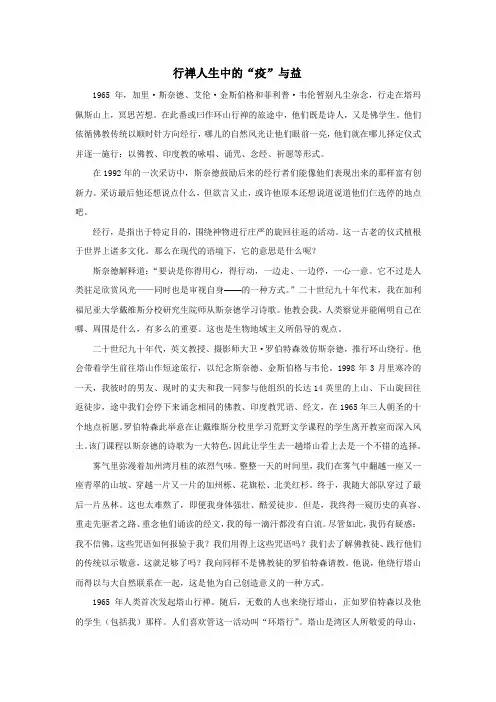
行禅人生中的“疫”与益1965年,加里·斯奈德、艾伦·金斯伯格和菲利普·韦伦暂别凡尘杂念,行走在塔玛佩斯山上,冥思苦想。
在此番或曰作环山行禅的旅途中,他们既是诗人,又是佛学生。
他们依循佛教传统以顺时针方向经行,哪儿的自然风光让他们眼前一亮,他们就在哪儿择定仪式并逐一施行:以佛教、印度教的咏唱、诵咒、念经、祈愿等形式。
在1992年的一次采访中,斯奈德鼓励后来的经行者们能像他们表现出来的那样富有创新力。
采访最后他还想说点什么,但欲言又止,或许他原本还想说道说道他们仨选停的地点吧。
经行,是指出于特定目的,围绕神物进行庄严的旋回往返的活动。
这一古老的仪式植根于世界上诸多文化。
那么在现代的语境下,它的意思是什么呢?斯奈德解释道:“要诀是你得用心,得行动,一边走、一边停,一心一意。
它不过是人类驻足欣赏风光——同时也是审视自身——的一种方式。
”二十世纪九十年代末,我在加利福尼亚大学戴维斯分校研究生院师从斯奈德学习诗歌。
他教会我,人类察觉并能阐明自己在哪、周围是什么,有多么的重要。
这也是生物地域主义所倡导的观点。
二十世纪九十年代,英文教授、摄影师大卫·罗伯特森效仿斯奈德,推行环山绕行。
他会带着学生前往塔山作短途旅行,以纪念斯奈德、金斯伯格与韦伦。
1998年3月里寒冷的一天,我彼时的男友、现时的丈夫和我一同参与他组织的长达14英里的上山、下山旋回往返徒步,途中我们会停下来诵念相同的佛教、印度教咒语、经文,在1965年三人朝圣的十个地点祈愿。
罗伯特森此举意在让戴维斯分校里学习荒野文学课程的学生离开教室而深入风土。
该门课程以斯奈德的诗歌为一大特色,因此让学生去一趟塔山看上去是一个不错的选择。
雾气里弥漫着加州湾月桂的浓烈气味。
整整一天的时间里,我们在雾气中翻越一座又一座青翠的山坡、穿越一片又一片的加州栎、花旗松、北美红杉。
终于,我随大部队穿过了最后一片丛林。
这也太难熬了,即便我身体强壮、酷爱徒步。
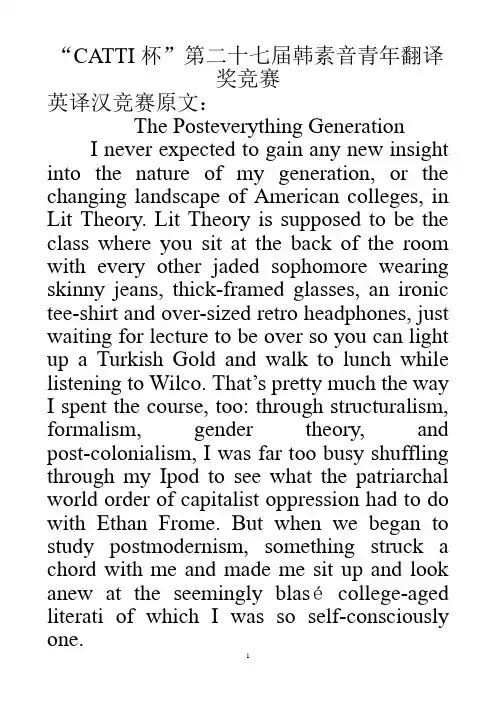
“CATTI杯”第二十七届韩素音青年翻译奖竞赛英译汉竞赛原文:The Posteverything GenerationI never expected to gain any new insight into the nature of my generation, or the changing landscape of American colleges, in Lit Theory. Lit Theory is supposed to be the class where you sit at the back of the room with every other jaded sophomore wearing skinny jeans, thick-framed glasses, an ironic tee-shirt and over-sized retro headphones, just waiting for lecture to be over so you can light up a Turkish Gold and walk to lunch while listening to Wilco. That’s pretty much the way I spent the course, too: through structuralism, formalism, gender theory, and post-colonialism, I was far too busy shuffling through my Ipod to see what the patriarchal world order of capitalist oppression had to do with Ethan Frome. But when we began to study postmodernism, something struck a chord with me and made me sit up and look anew at the seemingly blasécollege-aged literati of which I was so self-consciously one.According to my textbook, the problem with defining postmodernism is that it’s impossible. The difficulty is that it is so...post. It defines itself so negatively against what came before it –naturalism, romanticism and the wild revolution of modernism –that it’s sometimes hard to see what it actually is. It denies that anything can be explained neatly or even at all. It is parodic, detached, strange, and sometimes menacing to traditionalists who do not understand it. Although it arose in the post-war west (the term was coined in 1949), the generation that has witnessed its ascendance has yet to come up with an explanation of what postmodern attitudes mean for the future of culture or society. The subject intrigued me because, in a class otherwise consumed by dead-letter theories, postmodernism remained an open book, tempting to the young and curious. But it also intrigued me because the question of what postmodernism –what a movement so post-everything, so reticent to define itself –is spoke to a larger question about the political and popular culture of today, of the other jaded sophomores sitting around mewho had grown up in a postmodern world.In many ways, as a college-aged generation, we are also extremely post: post-Cold War, post-industrial, post-baby boom, post-9/11...at one point in his famous essay, “Postmodernism, or the Cultural Logic of Late Capitalism,”literary critic Frederic Jameson even calls us “post-literate.” We are a generation that is riding on the tail-end of a century of war and revolution that toppled civilizations, overturned repressive social orders, and left us with more privilege and opportunity than any other society in history. Ours could be an era to accomplish anything.And yet do we take to the streets and the airwaves and say “here we are, and this is what we demand”? Do we plant our flag of youthful rebellion on the mall in Washington and say “we are not leaving until we see change! Our eyes have been opened by our education and our conception of what is possible has been expanded by our privilege and we demand a better world because it is our right”? It would seem we do the opposite. We go to war without so much as questioning the rationale, we sign away our civil liberties,we say nothing when the Supreme Court uses Brown v. Board of Education to outlaw desegregation, and we sit back to watch the carnage on the evening news.On campus, we sign petitions, join organizations, put our names on mailing lists, make small-money contributions, volunteer a spare hour to tutor, and sport an entire wardrobe’s worth of Live Strong bracelets advertising our moderately priced opposition to everything from breast cancer to global warming. But what do we really stand for? Like a true postmodern generation we refuse to weave together an overarching narrative to our own political consciousness, to present a cast of inspirational or revolutionary characters on our public stage, or to define a specific philosophy. We are a story seemingly without direction or theme, structure or meaning –a generation defined negatively against what came before us. When Al Gore once said “It’s the combination of narcissism and nihilism that really defines postmodernism,” he might as well have been echoing his entire generation’s critique of our own. We are a generation for whom evenrevolution seems trite, and therefore as fair a target for bland imitation as anything else. We are the generation of the Che Geuvera tee-shirt.Jameson calls it “Pastiche”–“the wearing of a linguistic mask, speech in a dead language.” In literature, this means an author speaking in a style that is not his own –borrowing a voice and continuing to use it until the words lose all meaning and the chaos that is real life sets in. It is an imitation of an imitation, something that has been re-envisioned so many times the original model is no longer relevant or recognizable. It is mass-produced individualism, anticipated revolution. It is why postmodernism lacks cohesion, why it seems to lack purpose or direction. For us, the post-everything generation, pastiche is the use and reuse of the old clichés of social change and moral outrage –a perfunctory rebelliousness that has culminated in the age of rapidly multiplying non-profits and relief funds. We live our lives in masks and speak our minds in a dead language –the language of a society that expects us to agitate because that’s whatyoung people do. But how do we rebel against a generation that is expecting, anticipating, nostalgic for revolution?How do we rebel against parents that sometimes seem to want revolution more than we do? We don’t. We rebel by not rebelling. We wear the defunct masks of protest and moral outrage, but the real energy in campus activism is on the internet, with websites like . It is in the rapidly developing ability to communicate ideas and frustration in chatrooms instead of on the streets, and channel them into nationwide projects striving earnestly for moderate and peaceful change: we are the generation of Students Taking Action Now Darfur; we are the Rock the V ote generation; the generation of letter-writing campaigns and public interest lobbies; the alternative energy generation.College as America once knew it –as an incubator of radical social change –is coming to an end. To our generation the word “radicalism”evokes images of al Qaeda, not the Weathermen. “Campus takeover”sounds more like Virginia Tech in 2007 than Columbia University in 1968. Such phrasesare a dead language to us. They are vocabulary from another era that does not reflect the realities of today. However, the technological revolution, the revolution, the revolution of the organization kid, is just as real and just as profound as the revolution of the 1960’s –it is just not as visible. It is a work in progress, but it is there. Perhaps when our parents finally stop pointing out the things that we are not, the stories that we do not write, they will see the threads of our narrative begin to come together; they will see that behind our pastiche, the post generation speaks in a language that does make sense. We are writing a revolution. We are just putting it in our own words.汉译英竞赛原文:保护古村落就是保护“根性文化”传统村落是指拥有物质形态和非物质形态文化遗产,具有较高的历史、文化、科学、艺术、社会、经济价值的村落。
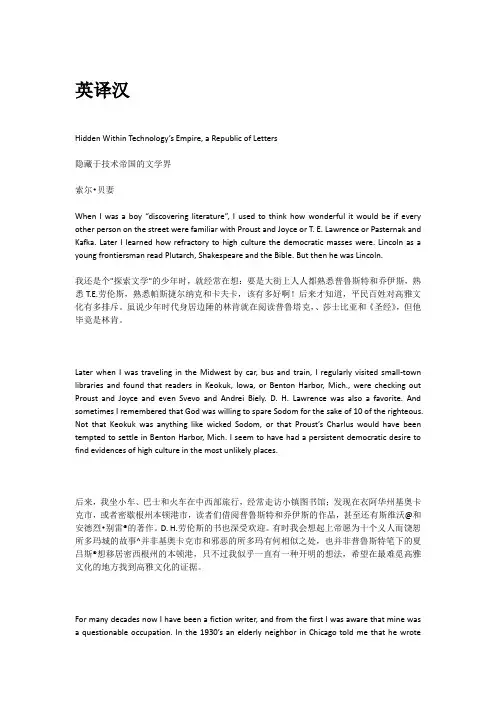
英译汉Hidden Within Technology’s Empire, a Republic of Letters隐藏于技术帝国的文学界索尔•贝妻When I was a boy “discovering literature”, I used to think how wonderful it would be if every other person on the street were familiar with Proust and Joyce or T. E. Lawrence or Pasternak and Kafka. Later I learned how refractory to high culture the democratic masses were. Lincoln as a young frontiersman read Plutarch, Shakespeare and the Bible. But then he was Lincoln.我还是个"探索文学"的少年时,就经常在想:要是大街上人人都熟悉普鲁斯特和乔伊斯,熟悉T.E.劳伦斯,熟悉帕斯捷尔纳克和卡夫卡,该有多好啊!后来才知道,平民百姓对高雅文化有多排斥。
虽说少年时代身居边陲的林肯就在阅读普鲁塔克,、莎士比亚和《圣经》,但他毕竟是林肯。
Later when I was traveling in the Midwest by car, bus and train, I regularly visited small-town libraries and found that readers in Keokuk, Iowa, or Benton Harbor, Mich., were checking out Proust and Joyce and even Svevo and Andrei Biely. D. H. Lawrence was also a favorite. And sometimes I remembered that God was willing to spare Sodom for the sake of 10 of the righteous. Not that Keokuk was anything like wicked Sodom, or that Proust’s Charlus would have been tempted to settle in Benton Harbor, Mich. I seem to have had a persistent democratic desire to find evidences of high culture in the most unlikely places.后来,我坐小车、巴士和火车在中西部旅行,经常走访小镇图书馆;发现在衣阿华州基奥卡克市,或者密歇根州本顿港市,读者们借阅普鲁斯特和乔伊斯的作品,甚至还有斯维沃@和安德烈•别雷®的著作。
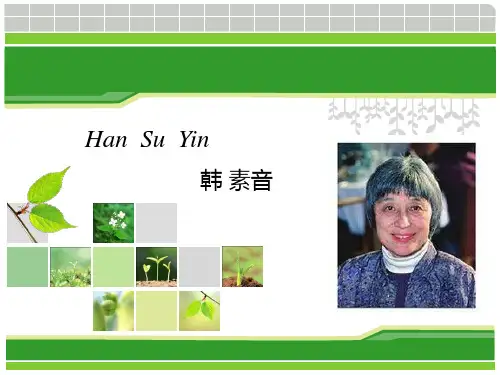
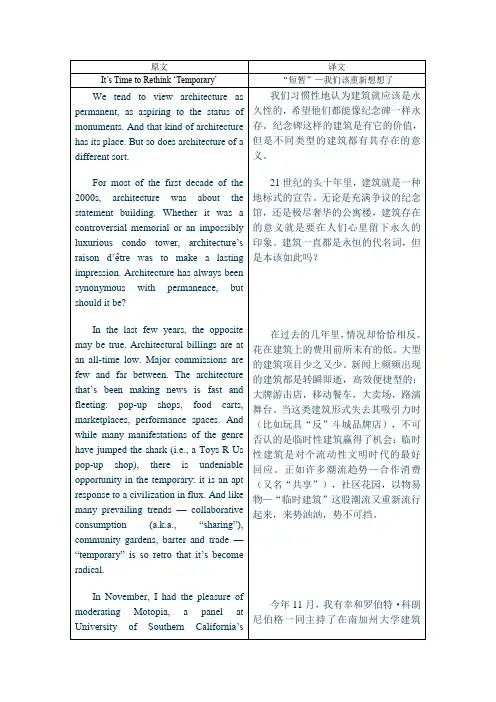
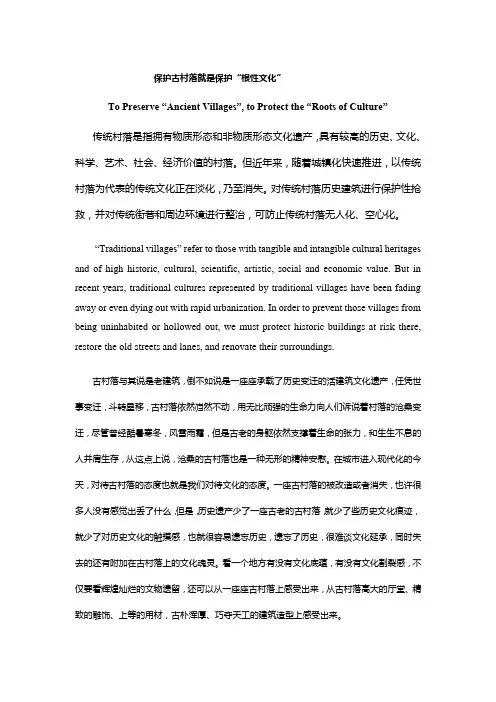
保护古村落就是保护“根性文化”To Preserve “Ancient Villages”, to Protect the “Roots of Culture”传统村落是指拥有物质形态和非物质形态文化遗产,具有较高的历史、文化、科学、艺术、社会、经济价值的村落。
但近年来,随着城镇化快速推进,以传统村落为代表的传统文化正在淡化,乃至消失。
对传统村落历史建筑进行保护性抢救,并对传统街巷和周边环境进行整治,可防止传统村落无人化、空心化。
“Traditional villages” refer to those with tangible and intangible cultural heritages and of high historic, cultural, scientific, artistic, social and economic value. But in recent years, traditional cultures represented by traditional villages have been fading away or even dying out with rapid urbanization. In order to prevent those villages from being uninhabited or hollowed out, we must protect historic buildings at risk there, restore the old streets and lanes, and renovate their surroundings.古村落与其说是老建筑,倒不如说是一座座承载了历史变迁的活建筑文化遗产,任凭世事变迁,斗转星移,古村落依然岿然不动,用无比顽强的生命力向人们诉说着村落的沧桑变迁,尽管曾经酷暑寒冬,风雪雨霜,但是古老的身躯依然支撑着生命的张力,和生生不息的人并肩生存,从这点上说,沧桑的古村落也是一种无形的精神安慰。
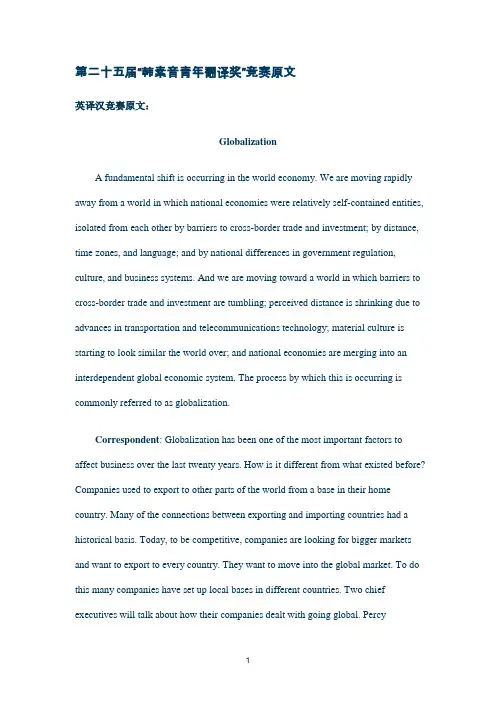
第二十五届“韩素音青年翻译奖”竞赛原文英译汉竞赛原文:GlobalizationA fundamental shift is occurring in the world economy. We are moving rapidly away from a world in which national economies were relatively self-contained entities, isolated from each other by barriers to cross-border trade and investment; by distance, time zones, and language; and by national differences in government regulation, culture, and business systems. And we are moving toward a world in which barriers to cross-border trade and investment are tumbling; perceived distance is shrinking due to advances in transportation and telecommunications technology; material culture is starting to look similar the world over; and national economies are merging into an interdependent global economic system. The process by which this is occurring is commonly referred to as globalization.Correspondent: Globalization has been one of the most important factors to affect business over the last twenty years. How is it different from what existed before? Companies used to export to other parts of the world from a base in their home country. Many of the connections between exporting and importing countries had a historical basis. Today, to be competitive, companies are looking for bigger markets and want to export to every country. They want to move into the global market. To do this many companies have set up local bases in different countries. Two chief executives will talk about how their companies dealt with going global. PercyBarnevik, one of the world’s most admired business leaders when he was Chairman of the international engineering group ABB and Dick Brown of telecommunications provider Cable & Wireless.Cable & Wireless already operates in many countries and is well-placed to take advantage of the increasingly global market for telecommunications. For Dick Brown globalization involves the economies of countries being connected to each other and companies doing business in many countries and therefore having multinational accounts.Dick Brown: The world is globalizing and the telecommunications industry is becoming more and more global, and so we feel we’re well-positioned in that market place. You see currency markets are more global tied, economies are globally connected, more so nowadays with expanded trade, more and more multinational accounts are doing business in many, many more countries. We’re a company at Cable & Wireless now, well-positioned to carry the traffic and to provide the services to more and more companies that now need to get to five countries or twelvec ountries, we’re often there.Correspondent: When Percy Barnevik became head of the international engineering group ABB, his task was to make globalization work. He decided to divide the business into over a thousand smaller companies. In this way he believed the company could be both global and local. In answering the question “How do you make globalization work?”, Percy Barnevik describes the “global glue” that keeps themany different people in ABB together. He then looks at the need to manage the three contradictions of company: it is decentralized but centrally controlled, it is big and small at the same time and it is both global and local.Percy Barnevik: We have now for ten years after our big merger created a “global glue” where people are tied together, where they don’t internally compete, but support each other, and you have global leaders with global responsibility and your local managers working with their profit centers, and if you have the right, so to say, agenda for these people and the right structure, you can use a scale of economy and your advantages of bigness but being small. We used to say you have three contradictions: decentralized and still centrally controlled, big and small, global and local, and, of course, to try to make these contradictions work together effectively, then I think you have a big organizational competitive edge.Correspondent: Globalizations can bring advantage to a business, but how does a company go global? Dick Brown mentions three ways companies can achieve “globalness”. Firstly, companies can work together in alliances. Secondly, they can acquire or buy other companies, and thirdly they can grow organically by expanding from their existing base.Dick Brown: Well, as you go global, and a handful or more of companies are going to really push out, in my view, to be truly global companies, and some of them, maybe all of them, will also work to be local. They’ll be local in chosen markets and global in their ability to carry their customers’ needs from continent A to c ontinent B.We want to be one of the companies that’s both global and local. Alliances are one way to be global, it’s not the only way to be global; you can acquire your way to “globalness”, you can organically grow your way to “globalness”, you can have alliances which help you get global quicker, so you take your pick.Percy Barnevik: You have to start from the top with local people who understand language, culture and so on, and I think in this global world where the East is coming up now, that’s a winni ng recipe.Correspondent: ABB already found the winning recipe. Its theory of globalization has become the company’s working practice. So how do you make theory work in practice? Percy Barnevik believes that successful globalization involves getting people to work together, overcoming national, cultural barriers and making the organization customer-driven.Percy Barnevik: You see the easy thing is to have the theory, but then to make the systems work, to make people really work together, to trust each other —Americans, Europeans, Asians, to get over these national cultural barriers and create a common glue, ABB, and then make them customer-driven. If you can achieve that, and create that culture deep down then I think you have an important competitive edge.Correspondent: What Dick Brown and Percy Barnevik have shown is that there are different routes to globalization and that companies have to work hard to succeed in going global. Actually one of the disadvantages of the Global Strategy is thatintegrated competitive moves can lead to the sacrificing of revenues, profits, or competitive positions in individual countries — especially when the subsidiary in one country is told to attack a global competitor in order to convey a signal or divert that competitor’s resources from another nation. The challenges managers of transnational corporations face are to identify and exploit cross-border synergies and to balance local demands with the global vision for the corporation. Building an effective transnational organization requires a corporate culture that values global dissimilarities across cultures and markets.汉译英竞赛原文:传统百货会否成为“消失的行业”数据显示,2011年中国电子商务市场整体交易规模达到7万亿元,同比增长46.4%。
韩素音青年翻译奖竞赛 | 译文评析(下) 原创: 中国译协 中国翻译协会 2017-01-10第28届韩素音青年翻译奖竞赛参考译文及评析—(下)汉译英汉译英竞赛原文屠呦呦秉持的,不是好事者争论的随着诺贝尔奖颁奖典礼的临近,持续2个月的“屠呦呦热”正在渐入高潮。
当地时间7日下午,屠呦呦在瑞典卡罗林斯卡学院发表题为“青蒿素——中医药给世界的一份礼物”的演讲,详细回顾了青蒿素的发现过程,并援引毛泽东的话称,中医药学“是一个伟大的宝库”。
对中医药而言,无论是自然科学“圣殿”中的这次演讲,还是即将颁发到屠呦呦手中的诺奖,自然都提供了极好的“正名”。
置于世界科学前沿的平台上,中医药学不仅真正被世界“看见”,更能因这种“看见”获得同世界对话的机会。
拨开层层迷雾之后,对话是促成发展的动力。
将迷雾拨开、使对话变成可能,是屠呦呦及其团队的莫大功劳。
但如果像部分舆论那样,将屠呦呦的告白简单视作其对中医的“背书”,乃至将其成就视作中医向西医下的“战书”,这样的心愿固然可嘉,却可能完全背离科学家的本意。
听过屠呦呦的报告,或是对其研究略作了解就知道,青蒿素的发现既来自于中医药“宝库”提供的积淀和灵感,也来自于西医严格的实验方法。
缺了其中任意一项,历史很可能转向截然不同的方向。
换言之,在“诺奖级”平台上促成中西医对话之前,屠呦呦及其团队的成果,正是长期“对话”的成果。
而此前绵延不绝的“中西医”之争,多多少少都游离了对话的本意,而陷于一种单向化的“争短长”。
持中医论者,不屑于西医的“按部就班”;持西医论者,不屑于中医的“随心所欲”。
双方都没有看到,“按部就班”背后本是实证依据,“随心所欲”背后则有文化内涵,两者完全可以兼容互补,何必非得二元对立?屠呦呦在演讲中坦言,“通过抗疟药青蒿素的研究历程,我深深地感到中西医药各有所长,两者有机结合,优势互补,当具有更大的开发潜力和良好的发展前景”。
这既是站在中医药立场上对西方科学界的一次告白,反过来也可理解为西医立场上对中医拥趸们的提醒。
202 国内刊号 C N 61-1499/C 2020年10月(下)陆璐(天津大学外国语言与文学学院,天津市 300350)韩素音翻译大赛Beyond Life 曹明伦中译版本归化策略赏析摘 要:本文以劳伦斯·韦努蒂的归化翻译理论为指导,对第二十一届韩素音国际翻译大赛“青年翻译奖”获奖作品——曹明伦先生对James Branch·Cabell作品Beyond Life的译作中亮点之处进行分析、欣赏,希望能让读者体会到归化翻译策略在散文翻译中的应用之妙。
关键词:归化;Beyond Life韩素音国际翻译比赛为广大青年翻译学者、翻译爱好者提供了优质的翻译参赛交流机会,每年的“韩素音青年翻译奖”得主的翻译作品都可谓是经过层层筛选,百里挑一的佳作,都值得翻译爱好者反复研读,细细体会其中精妙之处。
因此本文选取了第二十一届韩素音国际翻译比赛获奖作品——曹明伦先生对James Branch·Cabell作品Beyond Life的译作,从翻译的归化角度对译文的遣词造句,出彩高光之处进行赏析,希望可以对翻译学习工作者有一定的启发作用。
一、翻译中的归化理论翻译中的归化这一术语最早是由美国翻译家劳伦斯·韦努蒂在其作品《译者的隐身》中提出的。
按照劳伦斯·韦收稿日期:2020-07-27努蒂的说法,归化法是“把原作者带入译入语文化”。
(Venuti,1995:20)这里需要特别提出的是,归化与意译之间的区别。
相较于意译侧重于文本语言的翻译,归化则包涵语言、文化、思想等多个方面。
归化侧重于目标读者,以目标读者所习惯的思维方式和逻辑来组织语言,归化翻译要求译者向目的语的读者靠拢,使目标读者更加清晰明了地理解原文内容,译文更加偏向于目的语国家的文化、习俗、思维方式等。
(杨向男,2020:93)而根据散文翻译要以受众为中心,语言更贴近读者的原则(周娜,2018:153),归化理论在散文翻译中则更适用。
第十二届“韩素音青年翻译奖”竞赛原文及参考译文(汉译英)霞冰心四十年代初期,我在重庆郊外歌乐山闲居的时候,曾看到英文《读者文摘》上,有个很使我惊心的句子,是:May there be enough clouds in your life to make a beautiful sunset.我在一篇短文里曾把它译成:“愿你的生命中有够多的云翳,来造成一个美丽的黄昏。
”其实,这个sunset 应当译成“落照”或“落霞”。
霞,是我的老朋友了!我童年在海边、在山上,她都是我的最熟悉最美丽的小伙伴。
她每早每晚都在光明中和我说“早上好”或“明天见”。
但我直到几十年以后,才体会到云彩更多,霞光才愈美丽。
从云翳中外露的霞光,才是璀璨多彩的。
生命中不是只有快乐,也不是只有痛苦,快乐和痛苦是相生相成,互相衬托的。
快乐是一抹微云,痛苦是压城的乌云,这不同的云彩,在你生命的天边重叠着,在“夕阳无限好”的时候,就给你造成一个美丽的黄昏。
一个生命会到了“只是近黄昏”的时节,落霞也许会使人留恋、惆怅。
但人类的生命是永不止息的。
地球不停地绕着太阳自转。
东方不亮西方亮,我床前的晚霞,正向美国东岸的慰冰湖上走去……The Rosy CloudBingxinDuring the early 1940s I was living a retired life in the Gele Mountains in the suburbs of Chongqing (Chungking). One day, while reading the English language magazine Reader's Digest I found a sentence that touched me greatly. It read: "May there be enough clouds in your life to make a beautiful sunset."In a short article of mine, I quoted this sentence and translated it as "Yuan ni de shengming zhong you guo duo de yunyi, lai zaocheng yige meili de huanghun. " (literally: May there be enough clouds in your life to make a beautiful sunset.) *As I see it now, the word "sunset" in the English sentence should have been translated as luozhao (the glow at sunset) or luoxia (the rosy cloud at sunset), instead of dusk.She has been my dear old friend, the Rosy Cloud! She was my closest and most beautiful little companion when, in my childhood, I played on the beach or in the hills. Bathed in the brilliant sunshine, she would say to me "Good morning!" at dawn and "See you tomorrow!" at dusk. But not until several decades later did I come to realize that the more clouds there are the more beautiful the rays of sunlight will be, and the glow of the sun breaking through the clouds becomes most resplendent and colorful.Life contains neither unalloyed happiness nor mere misery. Happiness and misery beget, complement and set off each other.Happiness is a wisp of fleecy cloud; misery a mass of threatening dark cloud. These different clouds overlap on the horizon of your life to create a beautiful dusk for you when "the setting sun is most lovely indeed."**An individual's life must inevitably reach the point when "dusk is so near,"*** and the rosy sunset cloud may make one nostalgic and melancholy. But human life goes on and on. The Earth ceaselessly rotates on its axis around the sun. When it is dark in the east, it is light in the west. The rosy sunset cloud is now sailing past my window towards Lake Waban on the east coast of America ...*This sentence appears in Chinese and English in the article "For Young Readers Again, Newsletter No.4", written by Bing Xin in the Gele Mountains, on December 1, 1944.** and *** These two poetic lines are taken from a poem "On the Plain of Tombs" by Li Shangyin (813-858), a well-known poet of the Tang Dynasty (618-907). The two lines read like this: "The setting sun appears sublime, / But O! 'Tis near its dying time." (Tr. Xu Yuanchong) They imply that the setting sun has infinite beauty, but it is a pity that it is near the dusk, and the beautiful scene cannot last long. The two lines are often used to deplore the ephemeral nature of things, and to express the feelings at the loss of past glory and at the advent of old age.。
翻译评析:第二十二届韩素音青年翻译奖竟赛汉译英译文和译文评析蜗居在巷陌的寻常幸福Simple Happiness of Dwelling in the Back Streets隐逸的生活似乎在传统意识中一直被认为是幸福的至高境界。
但这种孤傲遁世同时也是孤独的,纯粹的隐者实属少数,而少数者的满足不能用来解读普世的幸福模样。
A secluded life has traditionally been deemed, as it seems, the supreme state of happiness, although such aloofness and retirement breed loneliness as well. Few people in fact end up as genuine recluses, whose contentment does not suffice to construe what happiness is for all.有道是小隐隐于野,大隐隐于市。
真正的幸福并不隐逸,可以在街市而不是丛林中去寻找。
As a common saying goes, while the “lesser hermit” lives in seclusion in the country, the “greater hermit” does so in the city. Not necessarily in solitude does reside true happiness which can be found in busy streets rather than in the woods.晨光,透过古色古香的雕花窗棂,给庭院里精致的盆景慢慢地化上一抹金黄的淡妆。
那煎鸡蛋的“刺啦”声袅袅升起,空气中开始充斥着稚嫩的童音、汽车启动的节奏、夫妻间甜蜜的道别,还有邻居们简单朴素的问好。
汉译英短文翻译(5篇)第一篇:汉译英短文翻译汉译英短文翻译近年来,中国城市化进人加速阶段,取得了极大的成就,同时也出现了种种错综复杂的问题。
今天的城乡建设速度之快、规模之大、耗资之巨、涉及面之广、尺度之大等已远非生产力低下时期所能及,建筑已成为一种重大的经济活动。
(102字)难点注释:1)城市化urbanization2)加速阶段an accelerating phase3)错综复杂的问题some complicated problems4)远非?一所能及surpass5)重大的经济活动a major economic pursuit世界各地有3,600万人染上了艾滋病—这比整个澳大利亚的人口还多。
目前,艾滋病是全球第4大死因,而在非洲则是头号罪魁。
在非洲,艾滋病使工人丧失工作,使家庭丧失经济来源,使父母丧失孩子。
在7个非洲国家中,巧岁至49岁的人口中艾滋病病毒感染者占到20%以上。
(119字)难点注释:1)染上艾滋病suffer from AIDS2)头号罪魁the chief culprit3)使……丧失deprive of 4)艾滋病病毒感染者people infected with HIV当今中国,对传真机的使用已十分普及,并成为现代重要的通讯终端设备。
据一项调查显示,2002年,中国市场对传真机的需求量约为200万台,国内产量仅满足了约30%的需求,进口机占据市场的主导地位。
(89字)难点注释:1)传真机fax machines2)通讯终端设备telecommunications terminal equipment3)占主导地位dominate2000年,美国数码相机的销量达到惊人的510万台,而1999年只有310万台。
数码相机的流行其原因非常简单:成像质量好且花费少。
此外,使用数码相机还能省去不少麻烦。
你不用买胶卷,所有的照片都被存在可反复使用的存储卡上。
一按快门,就可以马上在液晶显示屏上观察照片的效果。
Globalization全球化颜林海【标题解读】写作分析:何谓全球化?回答这个问题的过程就是就是人类对客观事物的认识过程,即“定义”的过程,换句话说,“定义”就是界定一种事物的本质(即意义)的说明。
“定义”有许多方式,最常见的有:列举法(illustration),分类法(classification),过程分析法(process analysis),因果法(cause and effect),比对法(comparison and contrast);除了以上方法外,还有特征枚举法(enumerating characteristics),词源法(etymology),类比法(analogy),排除法(exclusion)(M.S. Spangler & R.Werner,1990:131—135)。
从写作或其他媒介的角度,作为一篇文章的标题,作者必然要围绕标题来展开,而要展开这个话题,就必须对该字词加以界定,即定义。
篇体分析:从上下文看,这是一篇由一档电视谈话节目转写而成的书面文档;电视访谈类节目虽然重在访谈,但并非人与人之间的私下闲聊,因此,节目主持人也往往会提前大致拟定一个围绕某一话题而展开的提纲,这就与文章写作大同而小异了。
理解与翻译时,注意访谈中人物对话的转换,还要注意书写文本在断句上与访谈情景有时并不一致,如(25)句。
翻译分析:在翻译之前,译者也应对标题中涉及到的概念加以认识和理解。
译者在分析某一核心字词时必须注意该字词的音形义的分析。
此篇文章中globalization与音没有多大关系,主要分析该字词的“形”和“义”。
而字“形”的分析涉及到该词的词源和构词方式。
词源分析:Globalization一词逆推词源关系如下:globalization。
构词分析:globalization不过是globalize的名词拼写形式,核心意义在globalize;而此词的构形属于英语中“形容词+动词后缀ize”构词法,其表达的意义为“使...‘形容词’化”或“使...变成‘形容词’”。
城市的迷失
沿着瑗珲—腾冲线,这条1935年由胡焕庸先生发现并命名的中国人口、自然和历史地理的分界线,我们看到,从远距离贸易发展开始的那天起,利益和权力的渗透与分散,已经从根本结构上改变了城市的状态:城市在膨胀,人在疏离。
里尔的阿兰(Alain)的话到今天仍然振聋发聩:“金钱万能,不是凯撒万能。
”
Along the Line of Aihui and Tengchong, an invisible line discovered and named by Hu Huanyong in 1935 aimed at dividing the population, nature, history and geography of China, we can see that the permeation of interest and power has changed the status of city on its basic structure since the beginning day of long-distance trade, namely, the city was growing while people in it resulted in alienation. What Alain of Lille said still enlightened us that it’s the money who talks instead of Caesar.
在古罗马,柱子是按照人的比例划分的;到了文艺复兴时期,人就是世界上最美好的尺度。
今天的中国城市里,裁弯取直的河渠,向四面八方扩张的交通,膨胀硕大的以便于接纳更多商业行为的城市广场与建筑立面,都在告诉人们建设背后的权力与资本才是审美标准。
直到有一天,回过头来看到自己的孩子站在为车辆交通铺开的、满是尘土的路上,我们才发现,城市的大,却容不下一个让孩子们展开笑颜的机会。
In ancient Rome, pillars were designated according to the proportion of human body; while in the Renaissance, human acted as the most beautiful measure in the world. In the current Chinese cities, we see rivers got rechanneled to flow straightly, transportation system got expanded into all directions, urban plaza and building facade got designated larger and larger to accommodate more business actions. All of this have been telling us that the real aesthetical standard is the power and capital behind these constructions. Only in that day when we notice that our own children stand on lanes prepared for vehicles and covered with thick dust, we realize the city is so generous but can not give a chance for children to smile.
规划和设计的弊病,不在于追求利益这件事情本身,而在于追求利益和权利时的鬼迷心窍,把人类其他的需要都忘记得一干二净。
城市数量在变多、规模在扩大、城乡结构在解体,但城市的性质和目的,却被忘却了:最聪明的人不再懂得社会生活的形式,而最无知的人却准备去建设社会生活的形式。
It’s not bad just for interest to plan and design, but bad for completely ignoring the other needs of human in the blind pursuit of interest and power. While people witness that the city is growing in number and scale, and the urban and rural
structure is disintegrating, people, however, forget what the nature of city lie in and what city aims at. The most intelligent people no longer understand how to get involved into social life, and the most ignorant people are planning to create new way of social life.
城市大了,人小了。
人们和他们的城市息息相关而又格格不入。
人们不能获得有悖于商业世界、内容更充实更满意的生活手段,成为了旁观者、读者、听众和消极的观察者。
于是,我们年复一年不是真正地生活着,而是间接地生活着,远离内在的本性。
这些本性,掠过照片沉默和迷茫的脸孔,偶然从天空飘过的风筝看到,偶然从孩子们看到鸽子时脸上的笑靥看到。
The cities grow big while people’s hearts turn oppositely. We are closely connected with cities but at meantime against. We can not live in a fully satisfied and contented way that goes against business world, and can only look on the world, read the world, listen to the world and negatively observe the world. We, thereby year after year, are not really living, but indirectly living and being away from our inner nature. These nature, disappearing from silent photos and confused faces, could occasionally be found on a kite flying in the sky, or on some smiling faces of children at sight of doves.
人与城市的分离,让人无所适从;让人欣慰的是,大家都没有忘记
要生活这件事。
城市最早作为神祗的家园,代表了永恒的价值、安慰和神的力量。
过去人与人的隔离与区别,将不能维持下去;城市最终体现的不再是一个神化了的统治者的意志,而是城市每一个个体和全体的意志;它不再是冲突本身,而成为了为日常生活的矛盾与冲突、挑战与拥抱提供生动舞台的容器;艺术与思想有一天也能闪现在城市的角落,与人们的生活相交织。
也许到了这一天,我们才能真正说,城市让生活更美好。
The separation between human and city leaves people at loose ends; while what comforts us is that nobody forget to live. City, initially regarded as the home of deity, represents the eternal values, comforts and power of god. People will never be separated and differentiated just like in the old days; finally city will not reflect the deified wills of rulers but will show the wills of individual and the whole of city; it is not about conflict any more, but turns to be a stage accommodating contradiction and conflict happened in our daily life, as well as challenges and hugs; maybe one day art and thought would gradually flourish in cities and become closely connected with people’s lives. Perhaps only in that day can we truly say that city makes life better.。